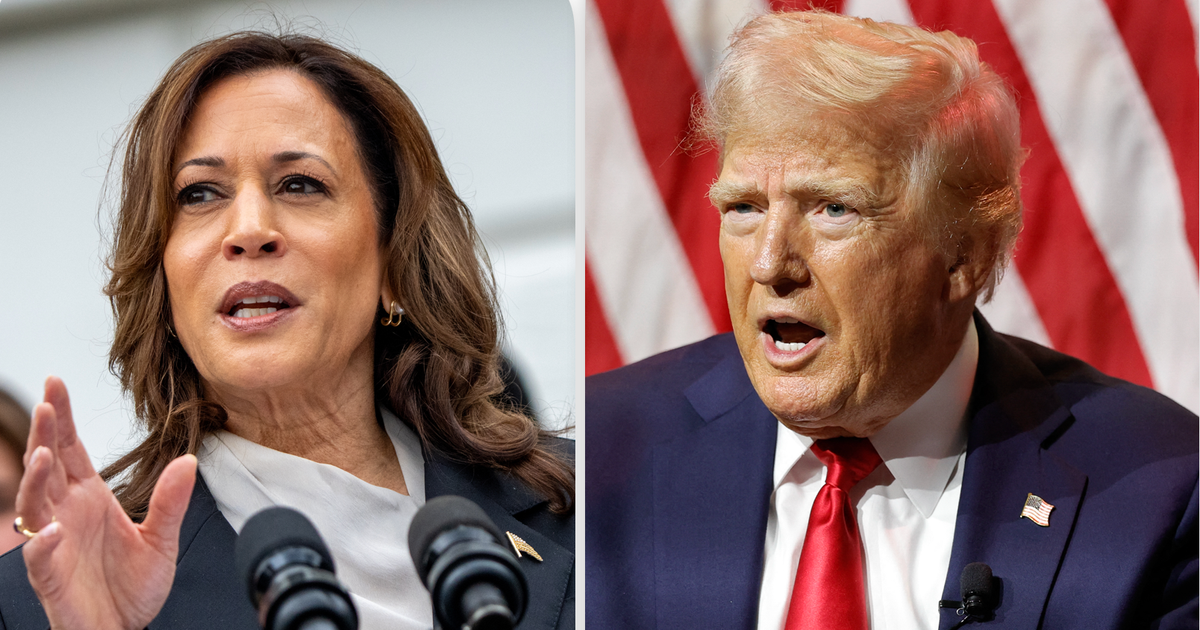Boosted by Democrats, younger and Black voters becoming more engaged and likely to vote, and by women decidedly thinking she’d favor their interests more, Vice President Kamala Harris has reset the 2024 presidential race.
She has a 1-point edge nationally — something President Biden never had (he was down by 5 points when he left the race) — and Harris and former President Donald Trump are tied across the collective battleground states.
Looking ahead, voters are also defining why the next few weeks could be critical.
On one hand, Harris has additional edges with the wider electorate that Mr. Biden did not: she’s leading Trump on being seen as having the cognitive health to serve, a measure that was of course central to the campaign before Mr. Biden stepped aside.
And on policy generally, Harris is seen as a little different from Mr. Biden, opening some possibility of defining her stances for the electorate now, either way.
But to Trump’s advantage, some critical things have not changed: he keeps his sizable lead on voters saying they’ll be financially better off with him and that his policies would decrease migrants at the border.
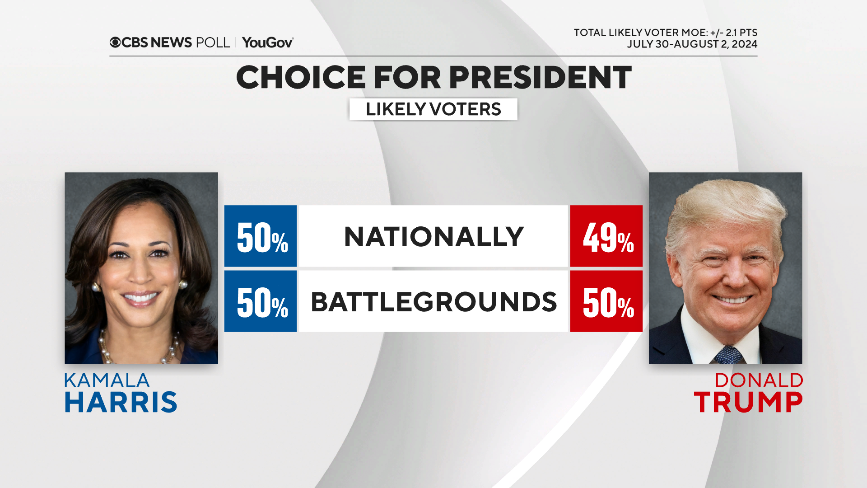
The percentage of Democrats who say they’ll “definitely vote” has risen to its highest point this year. That narrows the partisan “turnout gap” we’ve seen throughout the campaign.
And today much higher numbers of Black voters say they’ll vote, compared to July when Mr. Biden was the nominee.

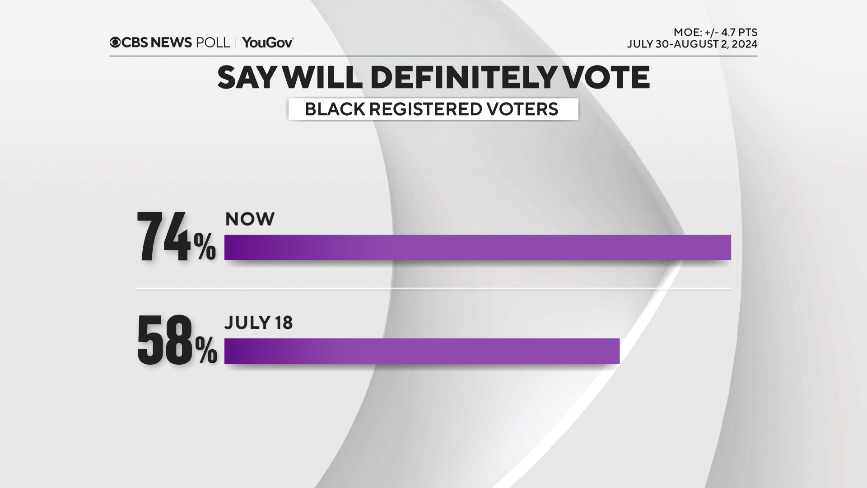
More generally, all this points to how the election might well hinge on turnout and specifically on marginal-turnout voter — those who don’t always show up to vote.
For example, among those who generally describe themselves as “sometimes” or “rarely” voting — but say they’ll definitely vote now — Harris is currently winning.
The women’s vote
Harris is leading among women voters — an edge Democrats have had and needed in recent history — with at least one big reason why: Women voters overwhelmingly think Harris would help women’s interests if elected. Far fewer women say that about Trump.
Voters overall tend to think Trump would help the interests of men more than they think he’d help those of women.
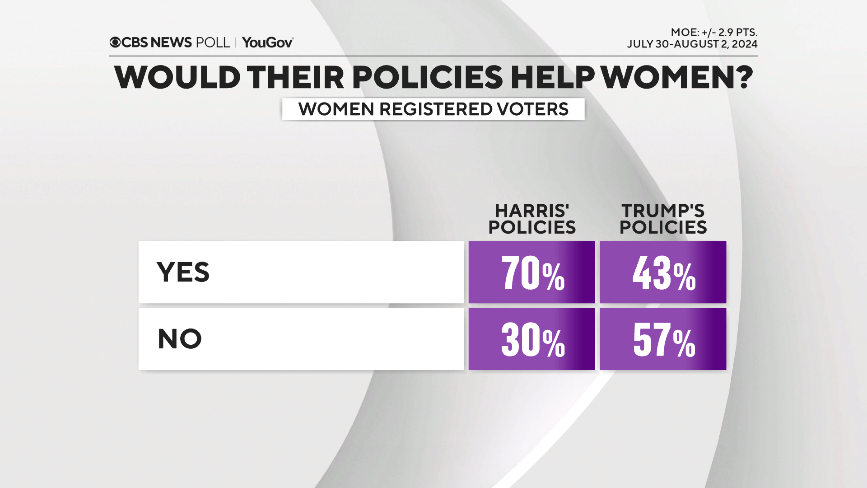
Related to this, the gender gap has widened some from earlier in the campaign. Harris leads Trump among women by a bigger margin than Mr. Biden had, while holding roughly the same support Mr. Biden had among men.
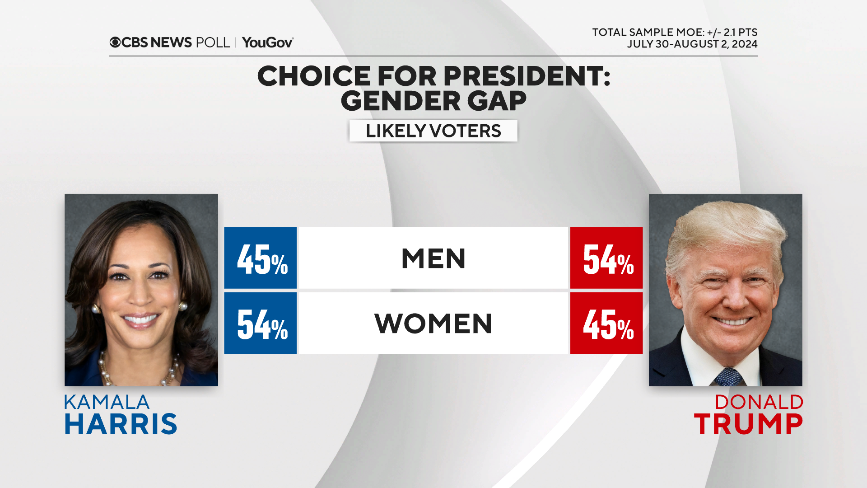
Enthusiasm and core Democratic groups
Most Democratic voters, and nearly half of voters overall, say that Harris as the Democratic nominee makes them feel more motivated to vote. (There is some countering effect, too: about a third of Trump voters are also more motivated to vote now that Harris is the nominee.)
It’s not just that Democrats are more excited, but also on a number of candidate qualities they feel they’ve gotten a candidate that can match up more closely with Trump.
Harris has an advantage over Trump on being seen as having the mental and cognitive health to serve, which was a critical deficit for Mr. Biden.
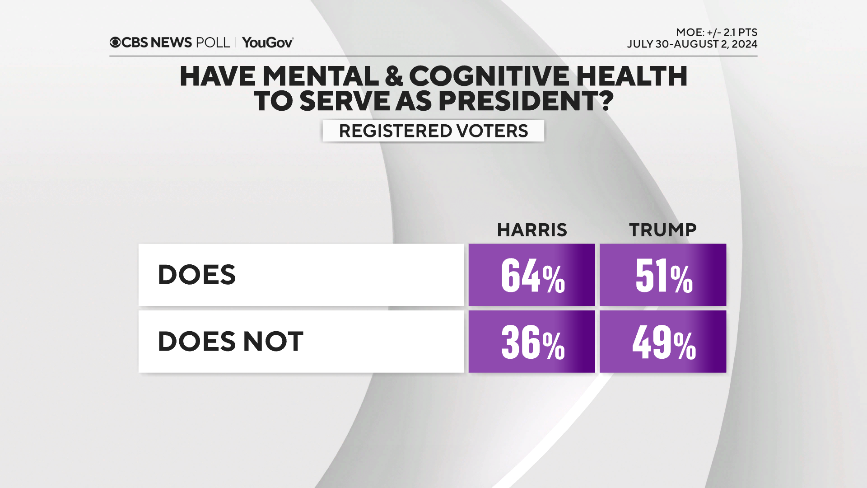
Across the wider set of voters, she’s ahead of Trump on being energetic and focused (two qualities Mr. Biden trailed Trump badly on). She’s even with Trump on perceived competence, and closer than Mr. Biden was on being tough and effective.
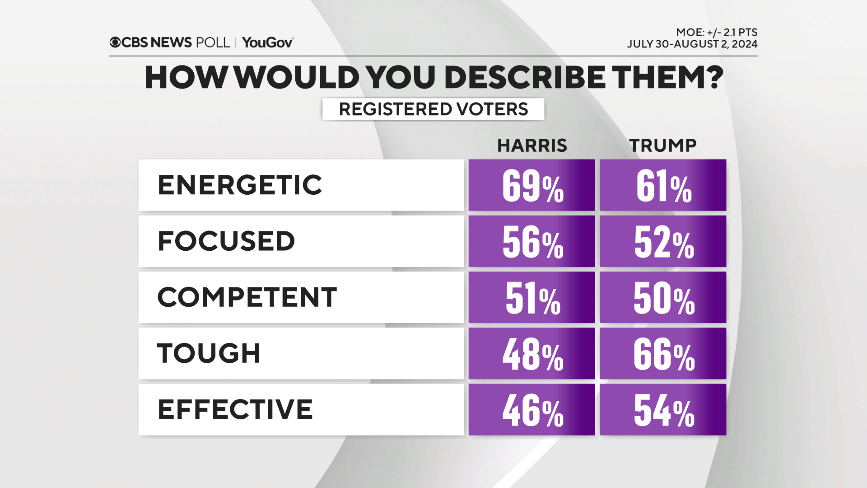
Black voters
Harris now has levels of support among Black voters that is closer to what Mr. Biden had in 2020 and higher than Mr. Biden was getting in polling this year.

Black voters think Harris will look out for everyone, including Black people.
Republicans and Trump voters think Harris will help the interests of Black people more so than of White people; Harris’ voters think she’ll look out for everyone across gender and race lines.
Trump’s voters also think he’ll help the interests of everyone, though the wider electorate tends to think he’ll help the interests of men and White people more so than others.

More widely, as voters assess where the country is, most say the country is ready to elect a Black woman as president, and that spans people voting for Harris and many who are not. It includes about three-quarters of independents and almost half of Republicans.
For some historical context, the 21st century has brought a shift in these kinds of views; back in 2000 just over a third had thought the nation was ready to elect a Black president. That had changed in CBS News polling in 2008 when Barack Obama was running, and then most said the country was ready to do so.
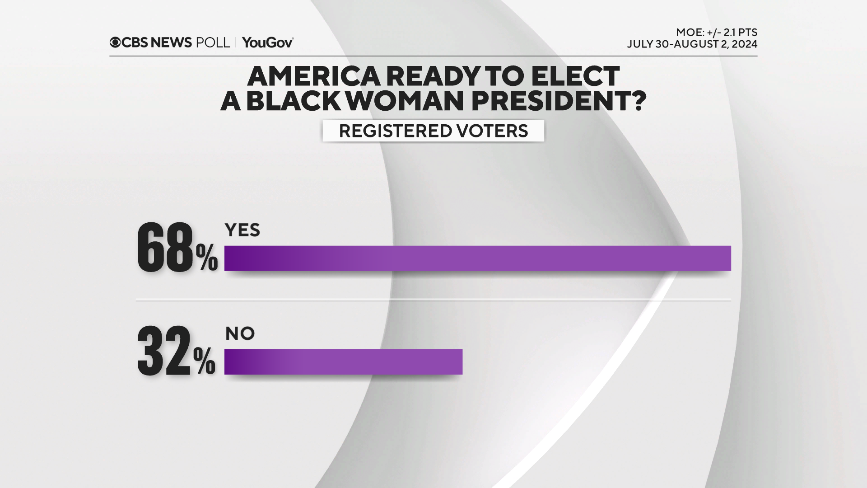
On policy and issues: What’s changed, what’s the same?
Harris’ policy views are seen as mostly — but not entirely — the same as Mr. Biden’s, opening the question of how the campaigns may spend the coming weeks looking to define those differences in the public mind.
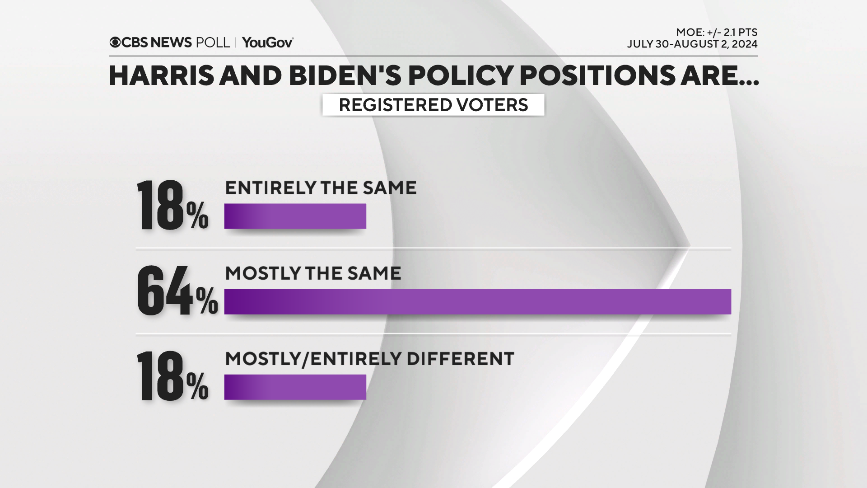
Voters do see her as somewhat or very liberal. (The more conservative one is, the more likely they are to view her as very liberal.) Then again, voters see Trump as very or somewhat conservative — and so that choice is more polarized than the electorate as a whole.
On having policies that will improve people’s finances: Harris opens in the same position as Mr. Biden was in July, trailing Trump substantially.
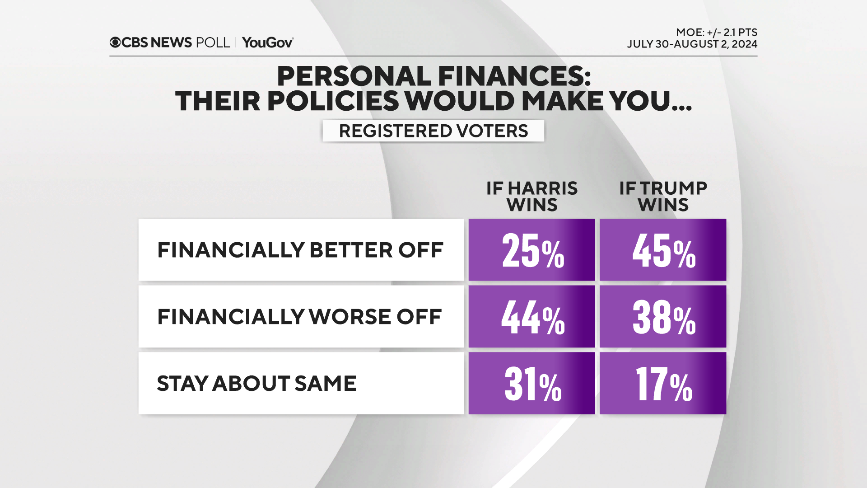
Half think Harris’ policies would increase the number of migrants trying to cross the border, similar to Mr. Biden, but that Trump’s would decrease that.
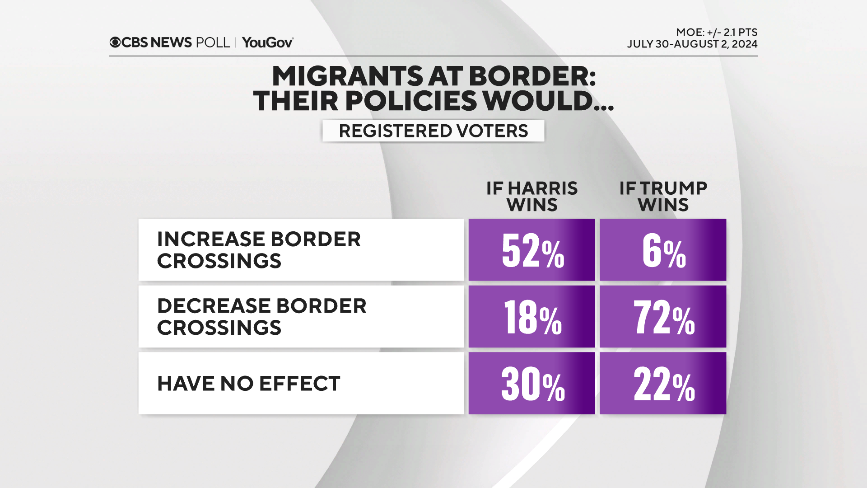
On protecting abortion: A majority think Harris will try to pass a national law making abortion legal.
Harris has been arguing that Trump will ban abortion nationwide if he gets back into office, but she may have more work to do convincing voters of that. Trump has said he’d leave the matter to the states, and voters are more inclined to think he will do just that.

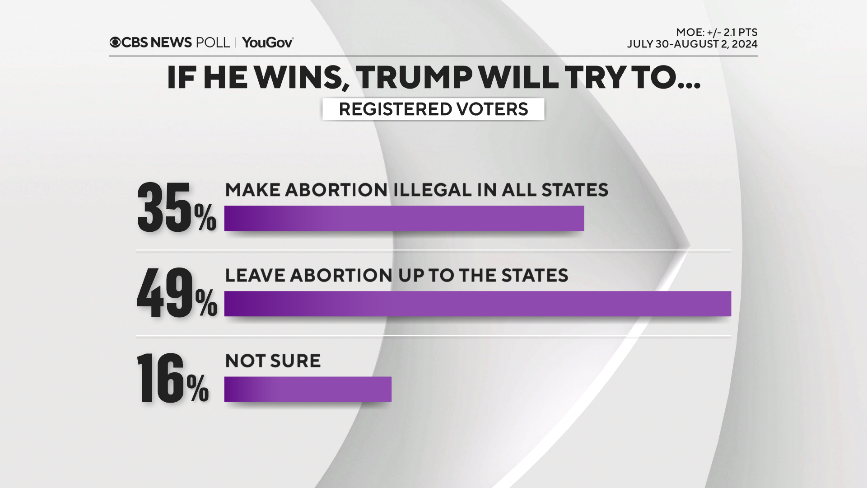
Looking ahead to the VP pick
On the whole most Democrats aren’t explicitly calling on Harris to pick a man, or to pick a woman as her running mate, and some are thinking strategically that the pick should be from a battleground state.
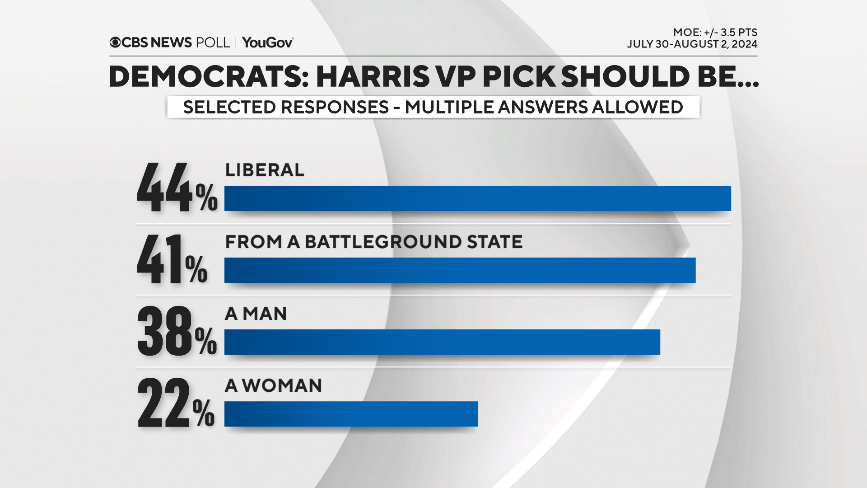
The impact of third parties
With third-party candidates included (though not all are on the ballot in all states), Harris’ national lead is similar, at two points.
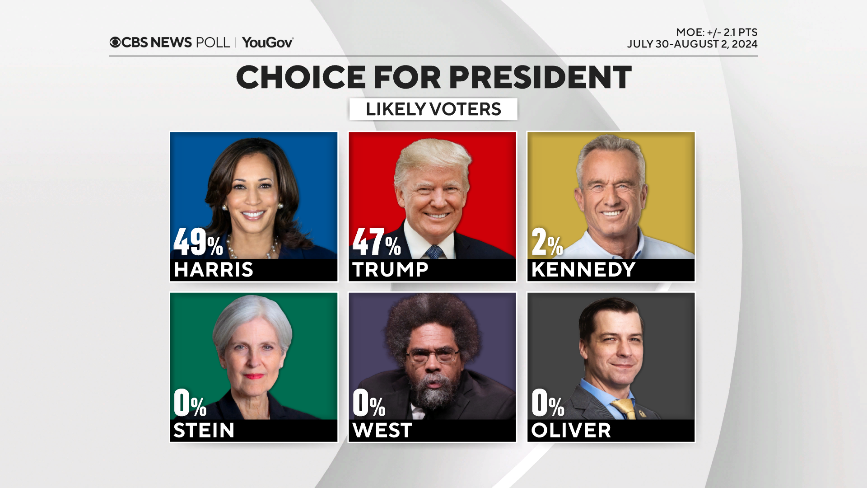
State-level estimates
In addition to our national polling, we have updated state-level estimates available for the seven battleground states that are derived from CBS News’ statistical model – which incorporates this survey data as well as multiple other data. All estimates within the margins of error, further underpinning the larger point of an even race.

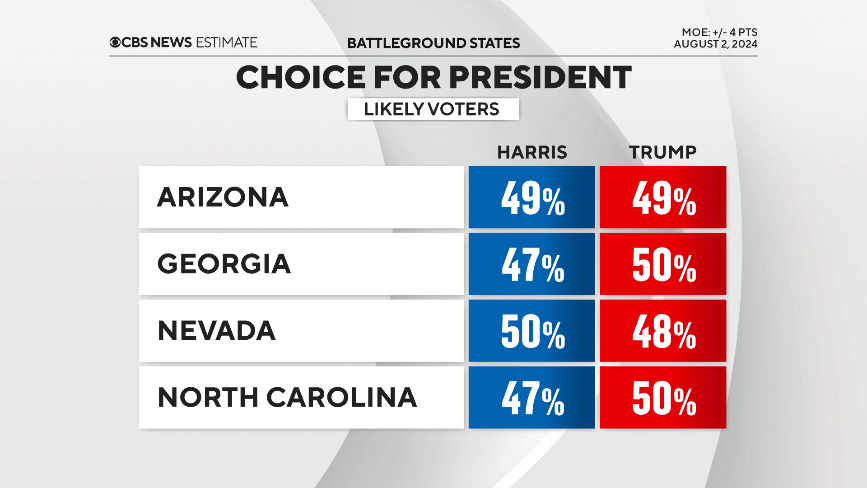
This CBS News/YouGov survey was conducted with a representative sample of 3,102 registered voters nationwide interviewed between July 30-August 2nd, 2024. The survey included an oversample of Black respondents. The final sample as reported was weighted according to gender, age, race, and education based on the U.S. Census American Community Survey and Current Population Survey, as well as to 2020 presidential vote. Respondents were selected to be representative of registered voters nationwide. The margin of error for registered voters is ±2.1 points. Battlegrounds are AZ GA MI NC NV PA WI.
Anthony Salvanto, Ph.D., is CBS News’ executive director of elections and surveys. He oversees the CBS News Poll and all surveys across topics and heads the CBS News Decision Desk that estimates outcomes on election nights


